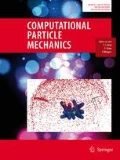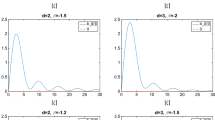Abstract
The incompressible smoothed particle hydrodynamics (ISPH) method is a numerical method widely used for accurately and efficiently solving flow problems with free surface effects. However, to date there has been little mathematical investigation of properties such as stability or convergence for this method. In this paper, unique solvability and stability are mathematically analyzed for implicit and semi-implicit schemes in the ISPH method. Three key conditions for unique solvability and stability are introduced: a connectivity condition with respect to particle distribution and smoothing length, a regularity condition for particle distribution, and a time step condition. The unique solvability of both the implicit and semi-implicit schemes in two- and three-dimensional spaces is established with the connectivity condition. The stability of the implicit scheme in two-dimensional space is established with the connectivity and regularity conditions. Moreover, with the addition of the time step condition, the stability of the semi-implicit scheme in two-dimensional space is established. As an application of these results, modified schemes are developed by redefining discrete parameters to automatically satisfy parts of these conditions.



Similar content being viewed by others
References
Asai M, Aly AM, Sonoda Y, Sakai Y (2012) A stabilized incompressible SPH method by relaxing the density invariance condition. J Appl Math, 139583
Ben Moussa B (2006) On the convergence of SPH method for scalar conservation laws with boundary conditions. Methods Appl Anal 13(1):29–62
Ben Moussa B, Vila J (2000) Convergence of SPH method for scalar nonlinear conservation laws. SIAM J Numer Anal 37(3):863–887
Chorin AJ (1968) Numerical solution of the Navier–Stokes equations. Math Comput 22(104):745–762
Cummins SJ, Rudman M (1999) An SPH projection method. J Comput Phys 152(2):584–607
Gingold RA, Monaghan JJ (1977) Smoothed particle hydrodynamics-theory and application to non-spherical stars. Mon Not R Astron Soc 181:375–389
Gresho PM (1990) On the theory of semi-implicit projection methods for viscous incompressible flow and its implementation via a finite element method that also introduces a nearly consistent mass matrix. Part 1: theory. Int J Numer Methods 11(5):587–620
Imoto Y (2016) Error estimates of generalized particle methods for the Poisson and heat equations. Ph.D. thesis, Kyushu University
Lind S, Stansby P (2016) High-order Eulerian incompressible smoothed particle hydrodynamics with transition to Lagrangian free-surface motion. J Comput Phys 326:290–311
Lind S, Xu R, Stansby P, Rogers BD (2012) Incompressible smoothed particle hydrodynamics for free-surface flows: a generalised diffusion-based algorithm for stability and validations for impulsive flows and propagating waves. J Comput Phys 231(4):1499–1523
Lucy LB (1977) A numerical approach to the testing of the fission hypothesis. Astron J 82:1013–1024
Morris JP, Fox PJ, Zhu Y (1997) Modeling low Reynolds number incompressible flows using SPH. J Comput Phys 136(1):214–226
Raviart PA (1985) An analysis of particle methods. In: Numerical methods in fluid dynamics (Como, 1983). Lecture Notes in Mathematics, vol 1127. Springer, Berlin
Shao S, Lo EY (2003) Incompressible SPH method for simulating Newtonian and non-Newtonian flows with a free surface. Adv Water Resour 26(7):787–800
Xu R, Stansby P, Laurence D (2009) Accuracy and stability in incompressible SPH (ISPH) based on the projection method and a new approach. J Comput Phys 228(18):6703–6725
Author information
Authors and Affiliations
Corresponding author
Ethics declarations
Conflict of interest
The author declares no conflicts of interest.
Additional information
Publisher's Note
Springer Nature remains neutral with regard to jurisdictional claims in published maps and institutional affiliations.
This work was supported by JSPS KAKENHI Grant Number 17K17585, JSPS A3 Foresight Program, and “Joint Usage/Research Center for Interdisciplinary Large-scale Information Infrastructures” in Japan (Project ID: jh180060-NAH).
Appendix A Mathematical tools
Appendix A Mathematical tools
1.1 Cauchy–Schwarz inequality
Let \(M\in \mathbb {N}\). For all \(a_i, b_i\in \mathbb {R}~(i=1,2,\ldots ,M)\), the following, called the Cauchy–Schwarz inequality, holds:
1.2 Grönwall’s inequality
Let \(M\in \mathbb {N}\). Assume that \(a_i, b_i>0~(i=0,1,\ldots ,M)\), \(c>0\) satisfy the inequality
Then, the following, called Grönwall’s inequality, holds:
Rights and permissions
About this article
Cite this article
Imoto, Y. Unique solvability and stability analysis for incompressible smoothed particle hydrodynamics method. Comp. Part. Mech. 6, 297–309 (2019). https://doi.org/10.1007/s40571-018-0214-7
Received:
Revised:
Accepted:
Published:
Issue Date:
DOI: https://doi.org/10.1007/s40571-018-0214-7



